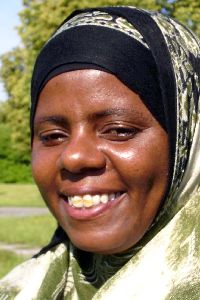Esha Faki Mwinyihaji

The Shari’a and Muslim Women’s Participation in the Public Sphere
In most ethnic communities in Kenya, the woman’s place is in the private domain of the home, while men belong to the public sphere. For a long time, education for girls has been given scanty emphasis in comparison to that of boys leaving the girls disadvantaged in various ways. This has in turn led to gender imbalance in positions of leadership and decision-making. The research examines the participation of Swahili Muslim Women in the public sphere since 1992, when multi-party politics were re-introduced in Kenya. By public sphere, I mean an arena or social space where meanings of social issues are articulated, distributed and negotiated. The public sphere here will serve as a general social horizon of experience in which everything that is actually or seemingly relevant for all members of society is integrated. The main question is, does the Shari’a accounts for the lack of Swahili Muslim women in leadership opportunities in the Kenyan Public sphere?
The research is being conducted in Mombasa District in Kenya. The choice of this area is based on the reasons that Mombasa District is inhabited by many Muslims and that it is considered a centre for Muslims in Kenya The study investigates Swahili Muslim women who are Sunni in Mombasa district. The study is based on research conducted between December 2006 and May 2007. In the months of December 2006 and February 2007 pre-test of interview questions were done to evaluate their reliability and validity. In the research open end interview methods are being used. Biographic and expert interviews were conducted and in total they are about 14. The ages of the informants ranged from 25 year to 68years. Five of these informants are theologians, two are ordinary Swahili women and the rest are professionals in their fields. Apart from these recorded interviews I held several informal talks with the informants on my area of research.
Generally preliminary findings reveal that the prospects of empowering women among the Swahili are being questioned along Islamic doctrinal and cultural grounds. Swahili Muslim women are facing traditional interpretations of religious texts which have for years reinforced patriarchal structures. Swahili Muslim women are faced with religious authorities who rule them as well as deeply rooted values of their culture. They lack resources on how to debate, mobilize and lobby their way into public sphere leadership, especially political leadership. The study also shows that socioeconomic development, to some extent is helping some few Swahili Muslim women to become educated, financially independent and to reach positions of authority and responsibility. They are visible in higher managerial ranks in cooperation and female organizations. However, in public sphere leadership especially political leadership, their aspirations and potential achievements are yet to be realized. In their quest to make an entrance into public sphere leadership they must question the “truths” by which their community functions.
The study also showed that the public sphere is not just there for women to take. There is competition, as it is amongst the people who are already there, the men. The theologians interviewed expressed concern over the ability of women to cope with public leadership as it is already hard work for men. The Swahili Muslim women have also to struggle to get a place using the same means which are in vogue. For instance, the requirement of parliamentary contestants in Kisauni constituency, to have policies touching on the squatter problem regardless of whether they are male or female, as the electorate face that as a major issue. Politics is considered a “dirty game” by some of the informants, as the participants at times use unconventional means to win elections. As such they have shied away from involvement in public sphere leadership.
Religion was another factor which has a bearing on the chances of Swahili Muslim women moving into public sphere leadership. There are several reasons advanced as to why the Shari’a is against Muslim women’s participation in the public sphere. The following are some of the reasons:
- Women lack the necessary knowledge about public life
- Female participation leads to the mixing of sexes (Ikhtilat and Khalwa)
- Female biological cycle and life cycle will cloud her judgement
- Women can never be heads of state
- Female need to travel with a mahram
There is always the quotation of Qur’an 4:34 that men are protectors of women. Whenever the issue of leadership arises and it is meant to put women in their rightful position of submission to men. Then there is the verse on hijab Qur’an 33:33. To further argue the point is the Hadith on Persia: that a society led by women will never prosper. This Hadith is a subject of debate in Islamic Public Discourses as a weak Hadith following its chain of transmission. These are scriptural matters that are given to Swahili Muslim women who take them as absolute but they lack understanding of the texts themselves. Both ordinary and professional women among the Swahili tend to group activities as halal or haram. The open window as per the Shari’a seems to be necessity as it dictates exceptions. Due to impelling necessity they can venture into public sphere with the support of Shari’a.
Customs has been cited by most of the respondents as a bottleneck to women’s participation in the public sphere. Swahili Muslim women cannot lead men or women, they cannot make good leaders as per local custom. Leadership is something reserved for men as per Swahili customs. Other customary bottlenecks include the seclusion of women at puberty and early marriages. Other minor obstacles include the lack of money as a resource for political mobilization, lack of unity among the Swahili Muslim women. If there is a formation and dependence of alliances among Swahili Muslim Women, they may actualize their goal of political leadership in public sphere.